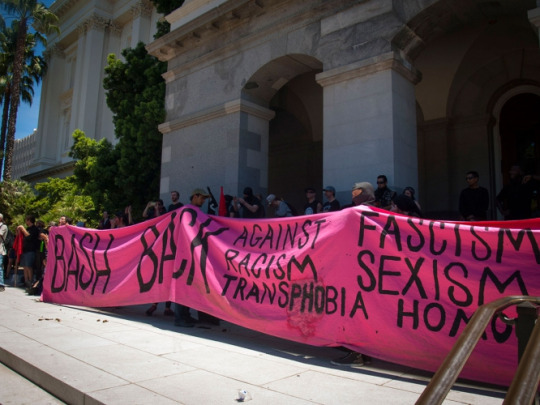Two years ago, we encountered several stories about sexual assaults among activists in our city, Ottawa. We were disturbed and, sadly, not surprised about what we heard. From our perspective, what was extra difficult was seeing that many people in the radical activist scene here, including ourselves, didn’t know how to respond effectively to this violence.
Punch Up is a small anarchist collective trying to help generate fierce, effective, and loving transformative movements. We believe that sexual assault among activists is not only a terrible harm, but also a major impediment to building durable movements. In what follows, we’d like to share a little about how we’ve tried to learn and respond in our city, and about the unresolved questions with which we’re still wrestling. We offer these reflections and experiences in the hope that they may be useful to others.
Responding to harm and looking for “community”
We saw activists, including ourselves, relating with these sexual assaults in two main ways: on the one hand, personal conversations and, on the other hand, public but frequently vague call-outs on social media. In the call-outs, people often appealed to “the community” to do something. While these two approaches have value in many circumstances, they didn’t seem sufficient to us. In fact, the revelations about sexual assault in the Ottawa radical activist scene brought up a lot of questions for us about what “community” means. In this way, our experience resonates strongly with what the Bay Area Transformative Justice Collective describe in their “Pods and Pod Mapping Worksheet”:
we found that, not surprisingly, many people do not feel connected to a “community” and, even more so, most people did not know what “community” meant or had wildly different definitions and understandings of “community.” For some, “community” was an overarching term that encompassed huge numbers of people based on identity (e.g. “the feminist community”); while for others “community,” referred to a specific set of arbitrary values, practices and/or relationships (e.g. “I don’t know them well, but we’re in community with each other”); or some defined “community” simply by geographic location, regardless of relationship or identity (e.g. “the Bay Area community”). We found that people romanticized community; or though they felt connected to a community at large, they only had significant and trustworthy relationships with very few actual people who may or may not be part of that community.
Looking seriously at the Ottawa radical activist scene, we didn’t see anything like a coherent “community” capable of following up on accusations and holding anyone accountable, much less establishing expectations for how people should treat one another. However, influenced by materials in The Revolution Starts at Home and Accounting for Ourselves, we started examining our context more closely. What we noticed was a range of formations – activist groups, collective houses, left-leaning trade unions and student organizations, and others – in which people have ongoing working relationships, generate group expectations, and carry out collective activities. We began wondering about what potential these formations, with all of their limits and imperfections, might have for responding to harm in transformative ways.
Finding resources and developing a framework
We also decided to ask for help. We contacted experienced activists we know and trust, and we asked for things to read, especially formal policies and procedures for conflict resolution and accountability. If we didn’t already have the sense that these are major issues affecting movements and communities in struggle, the deluge of resources we received certainly made this clear. Sifting through the materials and assessing our limited time, we decided to focus our collective attention on the writings we list below. This is a small fraction of what is available, much of which focuses on how to set up response systems for when harm has occurred.
We used these materials, along with conversations and group reflection, to draft our own Conflict Resolution and Accountability Framework – a plan for what we’ll do within our collective if people are having conflict or if someone harms someone else. The difference between these things – conflict and harm – is power-saturated and can be hard to articulate, and we’ve had lots of discussion about this, which we think will be ongoing. We see this as a living document, one that we will continue to revise as we use and modify our procedures in real, messy situations.
Supporting other groups in creating accountability plans
The work of developing this framework was illuminating. It revealed to us how rare it is for groups to do this kind of work before they are confronting a crisis. So, we decided to host a workshop for other groups in Ottawa to come together and begin gathering resources to draft their own structures and processes. We called it “Planning to Be Good to Each Other: Accountability in Organizations,” and we invited groups that are mostly small, autonomous, and committed to some form of anti-authoritarian and feminist practice. Because we hadn’t heard of other workshops like this and because people have since expressed interest in what we did, here we will give some detail about how we approached organizing it.
Two priorities for our collective are only doing work we have capacity for and doing it with very long lead time – trying to be proactive instead of reactive. So, about two months before we planned to have the workshop, we wrote a very long invitation email that we sent out to groups we thought might be interested in sending people. We asked them to register through an online survey, which also let us collect their accessibility and childcare needs. We also set up a “private” Facebook event so that people invited could invite or suggest comrades who should be invited (we struggled with the balance of wanting to have a small enough group for meaningful conversation versus being open to anyone who might be interested in coming). We arranged to have an experienced facilitator, we rented a wheelchair accessible space, offered snacks, and had a small quiet room with a trauma-informed person available in case people wanted to take a break from the workshop or process stuff that was coming up for them. We also budgeted for a sign language interpreter and for childcare, though in the end neither of those was used.
Nine groups sent one or two representatives, and we had a three-hour session. Our aim was to offer some skills and resources that folks could take back to their organizations, not to have them craft a plan in the workshop itself. Feedback on the workshop was positive, though in general people said that they felt it was, indeed, just a beginning. Within our collective, we felt that we had overestimated how much it would be possible to do in a three hour session, and we weren’t satisfied that we had succeeded in giving people the resources they would need to take back to their groups to develop their own policies. Since then, we have been reflecting on what we might do to further support groups in generating their own procedures. (Writing this description of our own process is part of this.)
Responding versus preventing?
One of the things we have thought about a lot, and don’t have a clear approach to change, is the fact that many of the accountability processes and policies that exist are primarily responsive: they are meant to come into play when something bad has happened between people. We believe this is a problem. For sure, it’s better to have a process in place than to be making one up on the fly, in the midst of a confusing and harmful situation. But if we want to really create a world in which sexual harm in particular is not part of our movements or our lives, we need practices in place that make it impossible or very hard for people to assault, manipulate, or dominate one another.
Punch Up, for us, is partly an experiment in accountability. We are trying to build and sustain a formation that can participate in preventing and responding to conflict and harm in our community. We’re accountable to one another, and as a closed collective, we can be transparent with others in our city about who is in our collective in a way that we hope helps others hold us responsible (though we aren’t sure what the mechanism for this would be!). We’re also actively trying to use liberatory practices in our work and to support other formations in Ottawa. But even as we’ve appreciated working in a closed collective, we worry about the effects of being in this formation within the broader context of movement work. We’re actively thinking about how we can meaningfully contribute to the broader ecology of movements and communities in struggle where we live.
Resources we consulted:
Chin-In Chen, Jai Dulani, and Leah Lakshmi Piepzna-Samarasinha, eds., The Revolution Starts at Home: Confronting Intimate Violence with Activist Communities
Creative Interventions, Creative Interventions Toolkit: A Practical Guide to Stop Interpersonal Violence
Danielle, Anti-authoritarian Approaches to Resolving and Transforming Conflict and Harm
Lukayo Faye Estrella, “Facilitating the Creation of Accountability Policies & Procedures” Tip Sheet
Jane Hereth and Chez Rumpf, Community Accountability for Survivors of Sexual Violence Toolkit
Briana Herman-Brand, Draft Proposal for “Community Accountability/Transformative Justice (CA/TJ) Framework for Decolonize/Occupy Seattle”
Esteban Lance Kelly and Jenna Peters-Golden, “Philly Stands Up Portrait of Praxis: An Anatomy of Accountability”
Rock Dove Collective, Dealing with Conflict
AJ Withers, Transformative Justice And/As Harm


